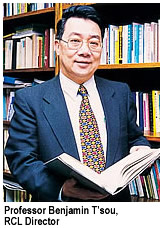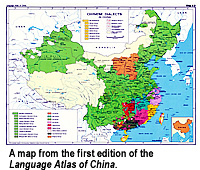CityU’s
Language Information Sciences Research Centre (RCL) and the
Chinese Academy of Social Sciences (CASS) are joining hands to apply advanced information technology to produce a new
Language Atlas of China that displays and explains the complex distribution of languages and dialects in
China and of the Chinese dialects outside
China.
The first edition of the Language Atlas of China received a Class 1 award in the national review on social science research in China in 1996. It was jointly produced by CASS, the Australian Academy of Humanities and CityU some 15 years ago.
“The Chinese population has grown tremendously in the last 15 years and its linguistic demographs has undergone significant changes,” said
Professor Benjamin T’sou, RCL Director.
Under an agreement signed by CityU and CASS on 20 June, RCL and CASS’s Institute of Linguistics and Institute of Ethnology and Anthropology will cooperate from 2004 to 2007 to produce a digital database and a new edition of the Language Atlas of China. In addition to updating information, the project also involves analytical studies. “We will look at how the speakers of different languages are distributed, why they are distributed the way they are, and the implications for culture and society and the formation of the Chinese nation, as China is the most multicultural and plurilingual nation in the world,” Professor T’sou said .
The new printed version of the atlas will include 70 maps, doubling the size of the first edition. “Due to massive immigration, the past years witnessed a significant change in the number of Chinese communities outside
China and the dialects they speak,” Professor T’sou said . The new atlas will include maps on the distribution of more than 150 Chinese speech communities outside
China, as well as maps on endangered languages and dialects in
China.
In addition to contributing to the initial planning and the editorial policy, RCL’s most significant contribution, Professor T’sou said, “will be in the digitization of the atlas which will facilitate frequent and easy updating of information.”
Established in 1994, the RCL focuses on making use of advancement in IT to contribute to studies in the humanities and social sciences. By integrating computational linguistics and advanced technology, for example, RCL developed a unique synchronous Chinese database, LIVAC (Linguistic Variation in Chinese Speech Communities), which regularly and simultaneously examines materials from representative Chinese newspapers and electronic media of Beijing, Hong Kong, Macau, Shanghai, Singapore and Taiwan, and offers an innovative approach to a variety of comparative studies on social and cultural changes, and useful applications in IT. “Now we hope to further advance language studies in a broader context with the application of IT to the making of the atlas,” Professor T’sou said .
In addition to the printed format, Professor T’sou plans to explore the possibility of developing a web-based atlas in the future.


